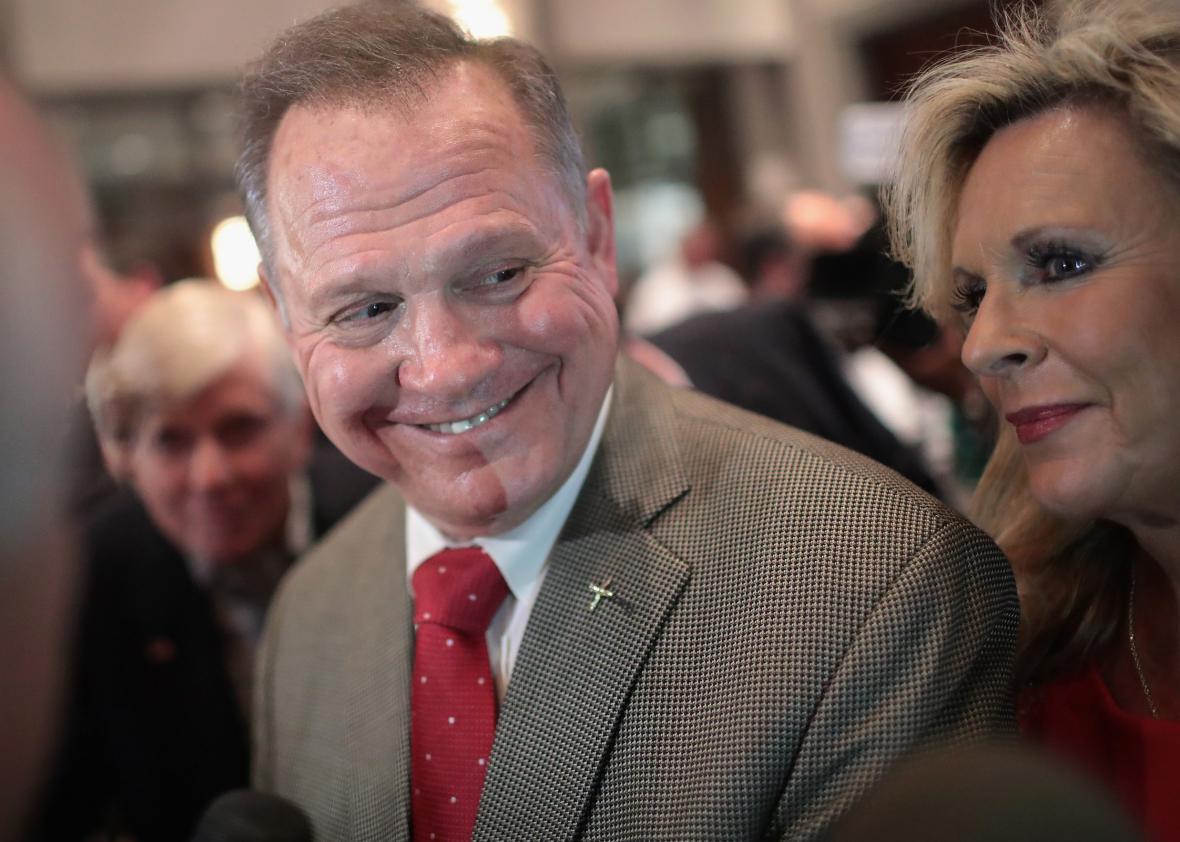Want to listen to this article out loud? Hear it on Slate Voice.
You’ve got to give it to the Republican primary voters of Alabama. It’s hard to conceive of a bigger middle finger to congressional Republicans than electing … this … to be their nominee for the United States Senate.
There is no single, definitive answer to how Roy Moore, American politics’ closest approximation of a theocrat who’s twice been removed from the state Supreme Court for disobeying orders, was able to beat the twin political machines of the White House and the Senate leadership in his comfortable defeat of Sen. Luther Strange. Strange was weak and compromised from the start, having been appointed to the job by the (now ex-) governor, Robert Bentley, whom he was supposed to be investigating, and Moore has a dedicated base of voters who will always turn out for his next endeavor once he’s been kicked out of his last one. But, as Senate Majority Leader Mitch McConnell said himself in his grudging congratulatory statement Tuesday night, Moore’s campaign “centered around a dissatisfaction with the progress made in Washington.” And it’s only going to get worse.
Being the incumbent in an ineffective Congress went a long way to doing Luther Strange in. In Moore, Senate Republicans have just received the ultimate manifestation of what primary voters will do if they don’t start producing. The base sent them a message, but they have no course correction.
It is not Strange’s fault—nor Arizona Sen. Jeff Flake’s, or Mississippi Sen. Roger Wicker’s, or any of the other senators that Steve Bannon now feels emboldened to take down—that Congress was unable to repeal Obamacare. That misallocation of blame that took Strange down will soon metastasize into a vicious cycle for Republican incumbents everywhere. If Moore wins the general election in December, the Republican Congress will become more ineffective. Primary voters will then blame “the establishment,” more incumbents will be endangered, and more Roy Moores will come to the Senate, making it more ineffective, and on and on.
Most Republicans in Congress want the same things that Trump wants: to pass his agenda. They want to repeal Obamacare, to cut taxes, to secure the southern border. Luther Strange did not come close to opposing any of this. His campaign message amounted to “I will do anything that Donald Trump tells me to do,” and in his brief senatorial tenure, he lived up to that promise. Trump could call Luther Strange and ask for a Mountain Dew, and Strange would instantly change into a butler’s outfit and bring the president his green sugar juice in a tumbler, alongside a few hamburgers for snacking. Trump’s endorsement of Strange confused so many because it was atypically rational of this president: He had a loyal vote in the Senate, and he wanted to keep it.
Now Strange’s loyal vote will be replaced with a wild card, pending December’s general election, who further erodes the functionality of the Senate Republican conference. The Republican establishment did not kill Obamacare repeal; Mitch McConnell worked quite hard to pull it off. The effort’s broad unpopularity cost it support on the moderate side, and its compromises lost it support among conservatives. The net effect of Moore replacing Strange will not be some sort of magical spine-stiffening among congressional Republicans that allows them to blow through mathematical constraints; it will be one more unreliable vote. “If Graham/Cassidy is anything less than a full repeal,” a campaign spokesman said last week, “Judge Moore will not vote for it.”
Roy Moore will not persuade eight Senate Democrats to support a border wall or per capita caps on Medicaid. Nor will Kelli Ward, if she’s able to defeat Flake in the Arizona primary, or Chris McDaniel, if he takes out Wicker in Mississippi. Kentucky Sen. Rand Paul could soon have a lot of company on his lonely island of senators who won’t vote for any repeal-and-replace package that spends any federal dollars on health care. The larger that bloc becomes, the less successful a president Donald Trump will be.
And the establishment will continue to eat all of the blame.
